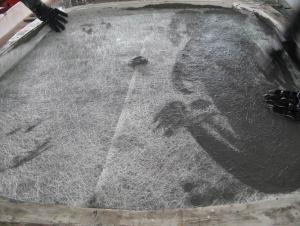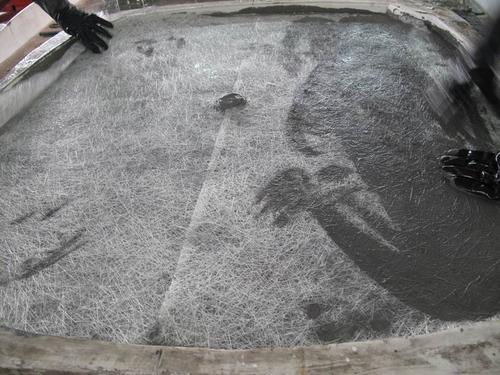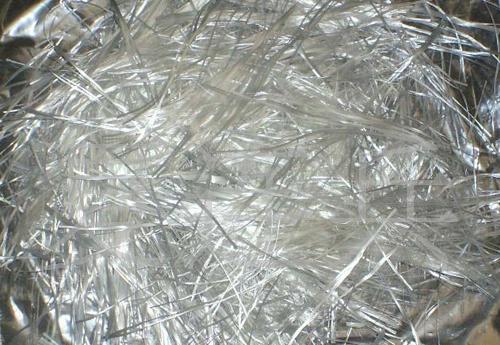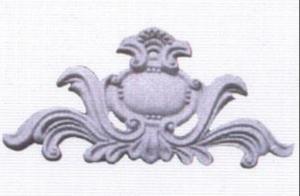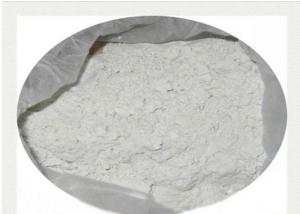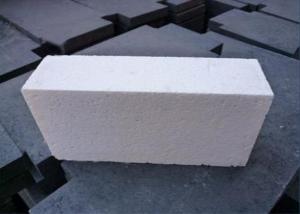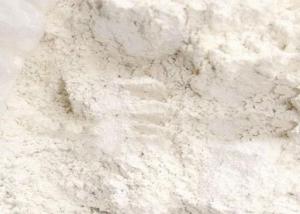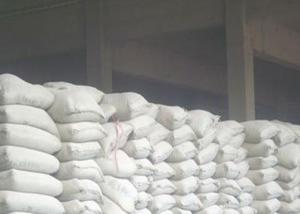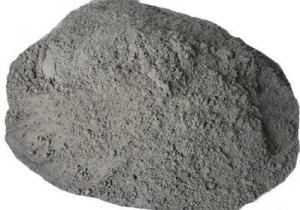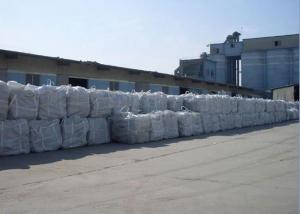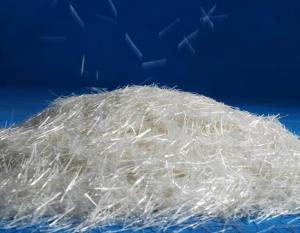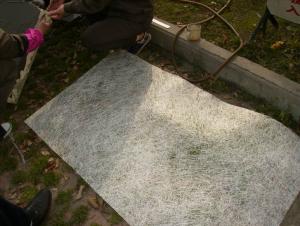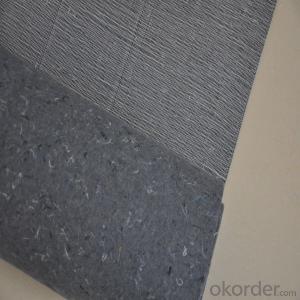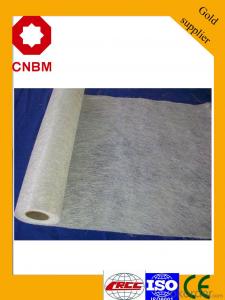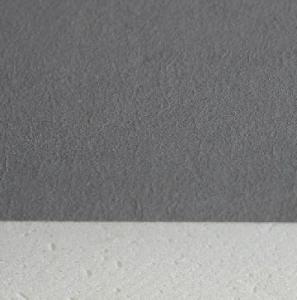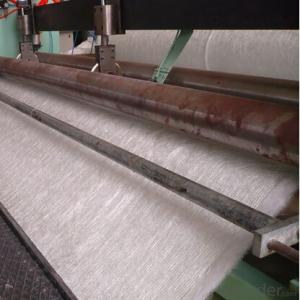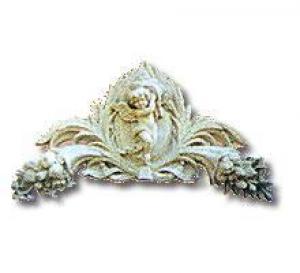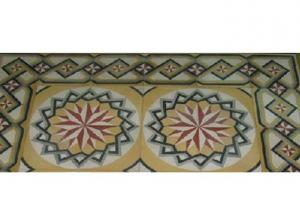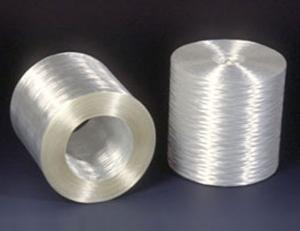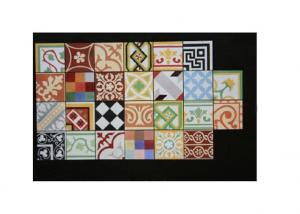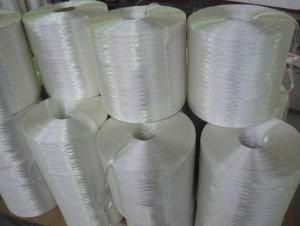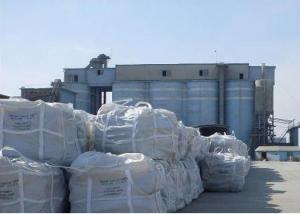AR fiberglass mat for concrete
- Loading Port:
- China Main Port
- Payment Terms:
- TT OR LC
- Min Order Qty:
- -
- Supply Capability:
- -
OKorder Service Pledge
OKorder Financial Service
You Might Also Like
Specifications
AR Fiberglass Mat is an engineered AR-stem designed for use in the reinforcement of very thin layer (5-25 mm). It may b
AR Fiberglass Mat has a high elastic modulus and tensile strength, making them ideal as an effective reinforcement for cement matrices. They will not rot or corrode, and are unaffected by UV radiation, making them suitable for use with minimal cover.
AR Fiberglass Matis available in a range of nominal weight: Standard is 150 G/M2. It is produced by chopping Huierjie AR-rovings into 20-50mm strands and forming into a mat with a suitable binder. The mat has an open construction to permit penetration by cement mortar. The engineered binder, which dissolves with water further, assists incorporation into a cement matrix.
AR Fiberglass Matmay be used as a positioned reinforcement flooring systems.
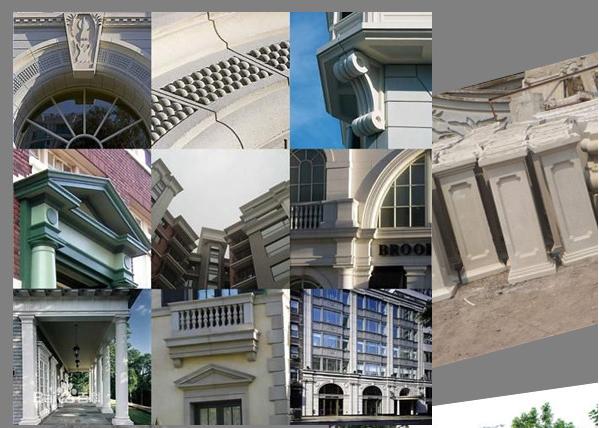
- Q: i am making a small crucible and i wanted to know simply, if masonry cement is qualified to accept temperatures of over 3000 degrees if it isnt then is there one i can make at home from realy simple to find materials?
- i would think that concrete would crack very easy at those temperatures.
- Q: Is there any way to remove rubber cement stains? From clothes and carpet?
- Rubber cement may be a great tool as an adhesive, but when that adhesive turns into a stained mess on your fancy tablecloth or carpet it's not that great anymore. Removing unwanted rubber cement stains takes time and patience along with a few simple tools.
- Q: Is the cement used for dental crowns antibacterial?
- Hi, dental cements like GIC(glass ionomer cements), Resin cements help repel bacteria because of the fluoride release. They dont have antibacterial properties but only protects the tooth from adhering(sticking) bacteria. Zinc Phosphates with eugenol has bacteriostaric properties but it dissolves in saliva easily.
- Q: in case of setting and hardening of cement, the first thing is stiffening
- Concrete is composed of cement and gravel/stone. When you add water to cement you get a chemical reaction called hydration. That reaction causes the cement to harden over time. The most common reaction that is similar is epoxy glue. Now, don't get me wrong, epoxy glue is NOT hardening because of hydration like cement. The bond in epoxy is an entirely chemical bond. But they are similar because as the epoxy hardens it goes thru a similar process. At first, it's liquid, then the liquid begins to stiffen and then hardens. Remember when you read the label on Epoxy that it has a hardening time (typically it's either 5 minute epoxy or 1 hour epoxy). But as you read on you find that it develops it's maximum strength over a period of 24 hours. As the epoxy dries it first stiffens.
- Q: I'm doing a small outdoor project and I need to stick some construction paper on to painted aluminum. I have some rubber cement from a craft store. Will this adhere to the metal and survive outdoor conditions of snow, wind, rain etc?
- Nope. Contact cement would be better. But I don't think anything will last long out of doors. Even the paper will start to fall apart after the first rain or heavy dew. And the sun will also cause it to decompose. Paper does not do well outside. You may have to rethink your project.
- Q: In addition, please help me answer the following:When a rock is mechanically weathered how does its surface area change? How does this influence chemical weathering?
- Three common cements for sedimentary rocks are calcite, silica, and iron oxide. Each can be identified by calcite cement will fizz with dilute hydrochloric acid, silica is the hardest cement producing the hardest sedimentary rocks, and sedimentary rocks with an iron oxide cement has an orange or red color.
- Q: I decided to pull out my braces. My teeth are fine, they look fine but they feel rough from the cement. I've tried invasive brushing but that didnt seem to work. Any thoughts/tips?
- Here is the home remedy which you can apply to remove cement from teeth after braces. You can mix 2 teaspoon of baking soda and 1/2 teaspoon of peroxide. Then dab the toothbrush into the mixture and move the mixture over your teeth for about two minutes. Do not swallow during this time. After the process has been done, use dental pick to gently scrap the cement from the teeth.Brushing with baking soda and peroxide may soften it enough that you can scrap it off.
- Q: different test on portland cement?
- The standard tests for cement are 1) Chemical composition 2) Fineness 3)Compressive strength 4)Tensile strength 5)Consistency 6)Setting times 7)Soundness
- Q: more accurately how should one space floor boards on a cement slab subfloor? every 4quot;...6quot; also any recommendations on what type of plywood/board to use? should i use insulation or just concrete board?
- They have about every answer to your questions for do-it-yourself projects. It's a great site.
- Q: It is cheaper to build a cement house than wood?
- Cement is not going to be cheaper. You will still have to put some kind of insulation (concrete will not be able to provide adequate insulation on it own) and then interior walls and finishes. Concrete itself is not cheaper as a material than wood, plus finding the skilled people to build complete walls and floors from concrete might be a challenge (depending on where you live). If that is not enough, think about laying electric and plumbing through the concrete. Trust me, they invented the stick-built (wooden frame) houses exactly for the reason of the lower construction costs, among other reasons.
Send your message to us
AR fiberglass mat for concrete
- Loading Port:
- China Main Port
- Payment Terms:
- TT OR LC
- Min Order Qty:
- -
- Supply Capability:
- -
OKorder Service Pledge
OKorder Financial Service
Similar products
Hot products
Hot Searches
Related keywords
